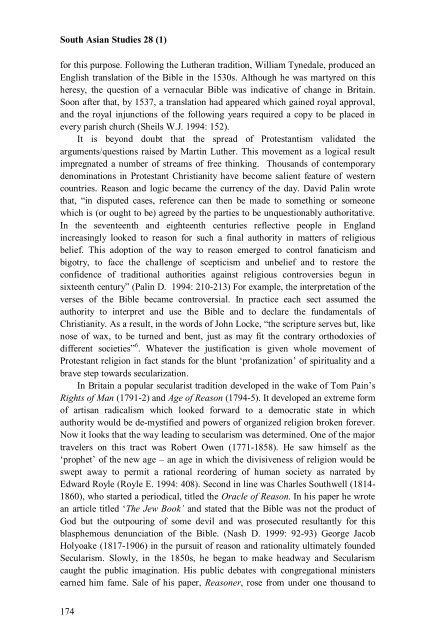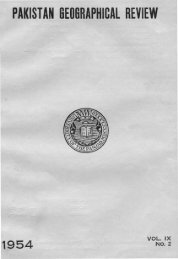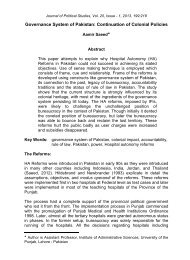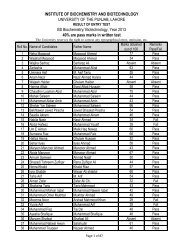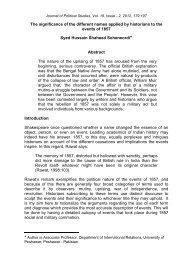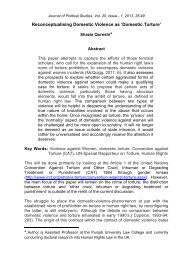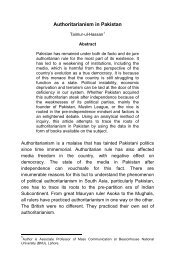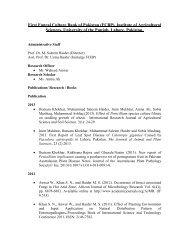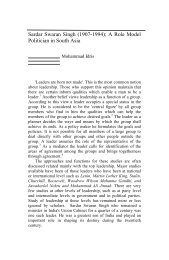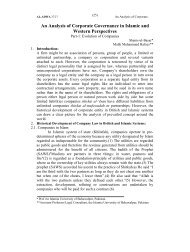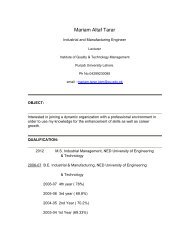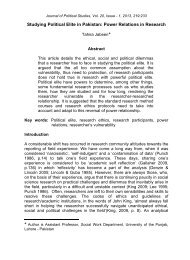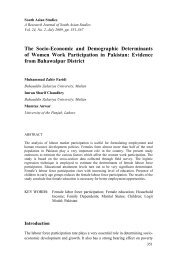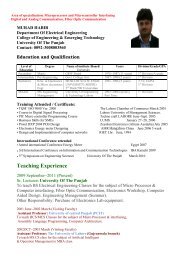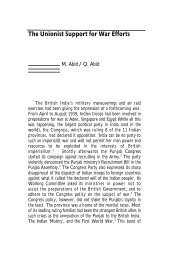Can Pakistan be a Secular State? - University of the Punjab
Can Pakistan be a Secular State? - University of the Punjab
Can Pakistan be a Secular State? - University of the Punjab
You also want an ePaper? Increase the reach of your titles
YUMPU automatically turns print PDFs into web optimized ePapers that Google loves.
South Asian Studies 28 (1)<br />
for this purpose. Following <strong>the</strong> Lu<strong>the</strong>ran tradition, William Tynedale, produced an<br />
English translation <strong>of</strong> <strong>the</strong> Bible in <strong>the</strong> 1530s. Although he was martyred on this<br />
heresy, <strong>the</strong> question <strong>of</strong> a vernacular Bible was indicative <strong>of</strong> change in Britain.<br />
Soon after that, by 1537, a translation had appeared which gained royal approval,<br />
and <strong>the</strong> royal injunctions <strong>of</strong> <strong>the</strong> following years required a copy to <strong>be</strong> placed in<br />
every parish church (Sheils W.J. 1994: 152).<br />
It is <strong>be</strong>yond doubt that <strong>the</strong> spread <strong>of</strong> Protestantism validated <strong>the</strong><br />
arguments/questions raised by Martin Lu<strong>the</strong>r. This movement as a logical result<br />
impregnated a num<strong>be</strong>r <strong>of</strong> streams <strong>of</strong> free thinking. Thousands <strong>of</strong> contemporary<br />
denominations in Protestant Christianity have <strong>be</strong>come salient feature <strong>of</strong> western<br />
countries. Reason and logic <strong>be</strong>came <strong>the</strong> currency <strong>of</strong> <strong>the</strong> day. David Palin wrote<br />
that, “in disputed cases, reference can <strong>the</strong>n <strong>be</strong> made to something or someone<br />
which is (or ought to <strong>be</strong>) agreed by <strong>the</strong> parties to <strong>be</strong> unquestionably authoritative.<br />
In <strong>the</strong> seventeenth and eighteenth centuries reflective people in England<br />
increasingly looked to reason for such a final authority in matters <strong>of</strong> religious<br />
<strong>be</strong>lief. This adoption <strong>of</strong> <strong>the</strong> way to reason emerged to control fanaticism and<br />
bigotry, to face <strong>the</strong> challenge <strong>of</strong> scepticism and un<strong>be</strong>lief and to restore <strong>the</strong><br />
confidence <strong>of</strong> traditional authorities against religious controversies <strong>be</strong>gun in<br />
sixteenth century” (Palin D. 1994: 210-213) For example, <strong>the</strong> interpretation <strong>of</strong> <strong>the</strong><br />
verses <strong>of</strong> <strong>the</strong> Bible <strong>be</strong>came controversial. In practice each sect assumed <strong>the</strong><br />
authority to interpret and use <strong>the</strong> Bible and to declare <strong>the</strong> fundamentals <strong>of</strong><br />
Christianity. As a result, in <strong>the</strong> words <strong>of</strong> John Locke, “<strong>the</strong> scripture serves but, like<br />
nose <strong>of</strong> wax, to <strong>be</strong> turned and <strong>be</strong>nt, just as may fit <strong>the</strong> contrary orthodoxies <strong>of</strong><br />
different societies” 6 . Whatever <strong>the</strong> justification is given whole movement <strong>of</strong><br />
Protestant religion in fact stands for <strong>the</strong> blunt ‘pr<strong>of</strong>anization’ <strong>of</strong> spirituality and a<br />
brave step towards secularization.<br />
In Britain a popular secularist tradition developed in <strong>the</strong> wake <strong>of</strong> Tom Pain’s<br />
Rights <strong>of</strong> Man (1791-2) and Age <strong>of</strong> Reason (1794-5). It developed an extreme form<br />
<strong>of</strong> artisan radicalism which looked forward to a democratic state in which<br />
authority would <strong>be</strong> de-mystified and powers <strong>of</strong> organized religion broken forever.<br />
Now it looks that <strong>the</strong> way leading to secularism was determined. One <strong>of</strong> <strong>the</strong> major<br />
travelers on this tract was Ro<strong>be</strong>rt Owen (1771-1858). He saw himself as <strong>the</strong><br />
‘prophet’ <strong>of</strong> <strong>the</strong> new age – an age in which <strong>the</strong> divisiveness <strong>of</strong> religion would <strong>be</strong><br />
swept away to permit a rational reordering <strong>of</strong> human society as narrated by<br />
Edward Royle (Royle E. 1994: 408). Second in line was Charles Southwell (1814-<br />
1860), who started a periodical, titled <strong>the</strong> Oracle <strong>of</strong> Reason. In his paper he wrote<br />
an article titled ‘The Jew Book’ and stated that <strong>the</strong> Bible was not <strong>the</strong> product <strong>of</strong><br />
God but <strong>the</strong> outpouring <strong>of</strong> some devil and was prosecuted resultantly for this<br />
blasphemous denunciation <strong>of</strong> <strong>the</strong> Bible. (Nash D. 1999: 92-93) George Jacob<br />
Holyoake (1817-1906) in <strong>the</strong> pursuit <strong>of</strong> reason and rationality ultimately founded<br />
<strong>Secular</strong>ism. Slowly, in <strong>the</strong> 1850s, he <strong>be</strong>gan to make headway and <strong>Secular</strong>ism<br />
caught <strong>the</strong> public imagination. His public debates with congregational ministers<br />
earned him fame. Sale <strong>of</strong> his paper, Reasoner, rose from under one thousand to<br />
174


